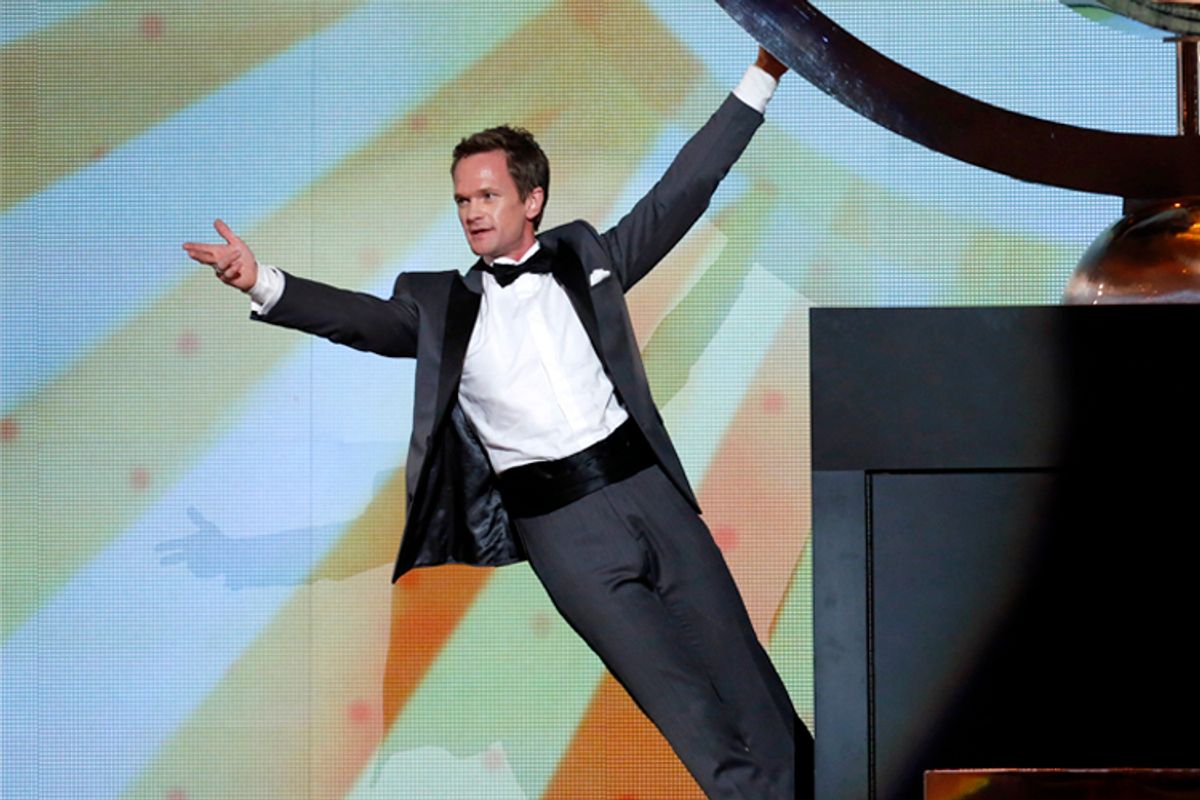Neil Patrick Harris is an over-the-top theatrical type who's brought his super-earnest, almost dorky energy to at least one high-profile awards-show hosting gig, who's nakedly ambitious when it comes to seeking new roles, who's perpetually the one who pulls focus from his castmates (if inadvertently).
He sounds a lot like Anne Hathaway.
And yet while Hathway's attempt to aim her Oscar-hosting gig at the folks in the cheap seats is still an entertainment-industry joke and her omnipresence during last year's movie awards season was met with disdain, Neil Patrick Harris seems nearly universally loved. He's hosted the Tonys four times and is set to host the Emmys a second time on Sunday; in so doing, he's effectively the public face of this year's Emmys home network, CBS, where he's outshone the likes of Jason Segel and Alyson Hannigan (no slouches) as the breakout star of "How I Met Your Mother." At both awards ceremonies, he's become known for bombastic musical numbers featuring chorus lines and the like; he's closed the Tonys with a quick rap about the events of the evening.
And yet Harris seems always to want more fame, in a way that grates when it's someone else doing the posed family pictures or the awards-show opening numbers or the spins in a maybe stunt-cast Broadway show. (The strapping, all-American Harris is to transform himself into an East German transvestite for "Hedwig and the Angry Inch.") In his repeated awards-show appearances -- the central component of his fame, even more so than the weekly spotlight on "Mother" -- Harris has impressed with a quick wit and genuinely startling dance moves. He's also revived a category of famous person that hasn't existed in decades: the song-and-dance man.
While there's a gender component to the hatred of Hathaway, who really is quite similar to Harris in her thirst for fame, she's also just a far more reserved individual; like many who have sung and danced during awards shows, she's also interested in being a movie star. She was invited to the Oscars not because she's good at singing or dancing (though she is), but because she is a famous actress, and her loud and big performance was so manic that the viewer felt as though she worried some other, bigger role were on the line. (The same status anxiety is true of Hugh Jackman, who hosted the Tonys for three years before graduating to A-list-ish film work.) A certain embarrassment creeps in; the star is either performing during the opening of an awards show to pass time between better gigs or in order to get one. Hugh Jackman or Anne Hathaway used the Oscars (or wanted to) as a platform to huge movie stardom; Seth MacFarlane, who sang in the opening, too, used it to promote his personal brand and his other projects; Harris has used the Tonys as a platform to the Tonys and the Emmys as a platform to the Emmys. He wants to be the most famous awards-show host there is. There's a certain honesty in that, even if it's completely foreign to the modern entertainment consumer.
It probably bears mentioning that Harris is one of the most famous openly gay entertainers, if not the most famous, in Hollywood; traditional routes to stardom may not be blocked to him, exactly, but there hasn't yet been an out star of blockbuster movies.
Perhaps Harris is so particularly grateful for the awards-show spotlight due to a long wilderness period; after years as a child star on "Doogie Howser, M.D.," his IMDb has a few years that are, well, empty; it's a fact Harris played up in his rise back to fame, doing the sort of image send-up, in the "Harold and Kumar" films, that the likes of James Van Der Beek and Fred Savage have attempted, later or in a less committed fashion. Harris's solicitousness for the audience's favor can sometimes be a bit much -- if a star demands your affection so fervently, you feel churlish when not giving it to them, which is not usually how stardom works -- but it comes from an honest place.
Unlike the Oscars, one of the most-watched entertainment programs of the year and one taken gravely seriously by fans, the Emmys are relatively low-stakes. Jimmy Kimmel, Jimmy Fallon, Jane Lynch -- the three most recent hosts of the program all did fine. There's very little downside to appearing on these shows -- it's not as though anyone can hate you for doing them. And so Harris has carved out an incredibly comfortable niche.
In so doing, he can sometimes appear a bit needy. But all that he's really demanding is that America watch him in five-minute segments of awards shows; unlike other stars, he has no apparent desire to take over any sphere larger than the proscenium of the theater.



Shares